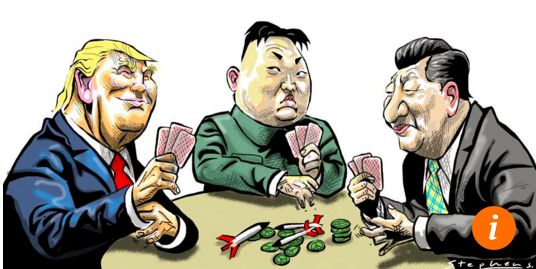AMI EDITOR IN CHIEF TOM PLATE WRITES – Mutual trust offers priceless value. In the second term of the Clinton presidency, during the reign of Jiang Zemin/Zhu Rongji, when both sides privileged economic engagement over geopolitical jiu-jitsu, the level of trust between the governments appeared on an uptick. When China entered the World Trade Organization – in 2001, just months into the George W. Bush administration – the Clintonites had reason to feel they’d made a bit of history. In fact the bilateral seemed headed in a pragmatic direction. There was, between the two, a quantum of solace.
Some degree of trust between this oddest of couples is indispensible if the relationship is not to become dysfunctional, or dystopian. In western social science, the power of transactional trust is viewed as central to social stability and economic efficiency. The very routine of habitually working together well can create its own positivity – a sort of social currency or extra human capital. Clinton’s ace trade negotiator Charlene Barshefsky (1997-2001) developed a close relationship with the exceptional Zhu Rongji, then China’s premier, and she’d fly to Beijing at his invitation to offer officials briefings on the intricacies of WTO. A bilateral bitcoin seemed in the minting.
These days, one key impediment in the all-important Sino-U.S. relationship is the relative waning in mutual trust. After the U.S. -triggered global meltdown of 2008-2009, Chinese reverence for the macro-economic wisdom (not to mention probity) of Wall Street/Washington evaporated. And ever since the rise of President Xi Jinping and his pushy Pacific policy in the South China Sea, America’s take on Beijing went from a little trust to a lot of verify. Today, the would-be bilateral bitcoin is battered.
Consider the divergence of viewpoints about the hot-headed and nuclearized Democratic People’s Republic of Korea. America’s current policy thrust, says Chinese Foreign Minister Wang Yi, is nothing less than a “freight train” careering toward calamity. Watch out: Might the Donald Trump administration might bluster us into a 21st century equivalent of the Cuban Missile Crisis? Beijing – and others across Asia – make a fair point when they wonder aloud why the U.S. somehow could live for decades with the capable USSR nuclear threat – but can’t tolerate the DPRK ‘s mini-arsenal. To be sure, everyone would be much less edgy if Pyongyang could be induced to downshift to non-nuclear; and surely only China working with the U.S. – as well as with Seoul and Tokyo – can make the near impossible happen.
But it’s probably too late for that – let’s just blame China, right? Certainly one gets from our media scant sense that President Xi might have a point in his bitterness about the missile system slated for installation on the sovereign soil of South Korea. They call it THAAD (for Terminal High Altitude Area Defense), designed to knock down DPRK -launched (or even, presumably, Chinese) missiles. The whole thing smells of U.S. military-industrial complex run amuck. The result of installation will be to render the Peninsula less stable (and perhaps even inspire Beijing to counter with new systems of its own). For the intricate installation could theoretically create opportunity for the U.S. to contemplate a first-strike: Knock out 90-95% of DPRK missile sites and assume THAAD will kill the retaliatory rest.
Front-running presidential candidate Moon Jae-in, of the center-left Minjoo Party, favors holding off on missile-defense deployment, for the moment at least. His South Korea benefits enormously from vigorous trade with the mainland. Then again, if THAAD is a dud in operation (hardly inconceivable with these complex systems), then its installation would have done nothing at all to protect South Korea – except to further spook Pyongyang and Beijing.
Caught in the dreary middle of this mess are our friends the South Koreans, now scampering to find a new president; and our friends the Japanese, who have everything they need to become a nuclear power — except public support. Yet the hawkish administration of Prime Minister Shinzo Abe might get exactly that if North Korean cowboys continue their missile practice runs, their paranoia magnified by macho U.S.-South Korean ground exercises mostly unneeded.
President Xi Jinping, who in early April is to travel to Mar-a-Lago Florida for a summit with President Trump, has a few cards he might play. For starters, his government could call off the mainland’s nationalistic dogs hounding South Korean businesses due to their government’s U.S. missile alliance. This infantile nonsense is beneath the dignity of China, a great and historic power, and does little to enhance mutual trust in East Asia. For his part, the U.S. might say it views Beijing’s overall presence in the South China Sea more like that of the U.S. in the Caribbean than that of Russia in Crimea, and agree with Mr Xi that a U.S. signature on a non-aggression pact with Pyongyang would be much less harrowing than a nuclear missile crisis – as even Tokyo has been nervously muttering.
Xi could use some face to show North Korean leader Kim Jong Un (they don’t like each other) that a nuclear freeze in place is a must if the regime-change option is to drop off the White House table. These gestures would help add to a sense of trust to U.S.-China relations. Even more detrimental than the imbalance of trade in the bilateral is the imbalance of trust. It needs to be put right.
Tom Plate is Loyola Marymount University’s Distinguished Scholar of Asian and Pacific Studies. Prof Plate is finishing up a book on China and the United States, based on his columns on the bilateral relationship that have since June 2015 appeared in the South China Morning Post, where a longer version of this article appeared earlier this week.

